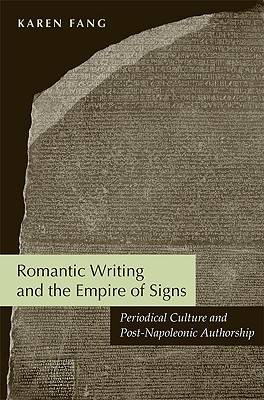
- We will send in 10–14 business days.
- Author: Karen Fang
- Publisher: University of Virginia Press
- ISBN-10: 0813928745
- ISBN-13: 9780813928746
- Format: 15.5 x 22.9 x 2.3 cm, kieti viršeliai
- Language: English
- SAVE -10% with code: EXTRA
Reviews
Description
Nineteenth-century periodicals frequently compared themselves to the imperial powers then dissecting the globe, and this interest in imperialism can be seen in the exotic motifs that surfaced in works by such late Romantic authors as John Keats, Charles Lamb, James Hogg, Letitia Landon, and Lord Byron. Karen Fang explores the collaboration of these authors with periodical magazines to show how an interdependent relationship between these visual themes and rhetorical style enabled these authors to model their writing on the imperial project.
Fang argues that in the decades after Waterloo late Romantic authors used imperial culture to capitalize on the contemporary explosion of periodical magazines. This proliferation of "post-Napoleonic" writing--often referencing exotic locales--both revises longstanding notions about literary orientalism and reveals a remarkable synthesis of Romantic idealism with contemporary cultural materialism that heretofore has not been explored. Indeed, in interlocking case studies that span the reach of British conquest, ranging from Greece, China, and Egypt to Italy and Tahiti, Fang challenges a major convention of periodical publication. While periodicals are usually thought to be defined by time, this account of the geographic attention exerted by late Romantic authors shows them to be equally concerned with space.
With its exploration of magazines and imperialism as a context for Romantic writing, culture, and aesthetics, this book will appeal not only to scholars of book history and reading cultures but also to those of nineteenth-century British writing and history.
EXTRA 10 % discount with code: EXTRA
The promotion ends in 21d.09:15:19
The discount code is valid when purchasing from 10 €. Discounts do not stack.
- Author: Karen Fang
- Publisher: University of Virginia Press
- ISBN-10: 0813928745
- ISBN-13: 9780813928746
- Format: 15.5 x 22.9 x 2.3 cm, kieti viršeliai
- Language: English English
Nineteenth-century periodicals frequently compared themselves to the imperial powers then dissecting the globe, and this interest in imperialism can be seen in the exotic motifs that surfaced in works by such late Romantic authors as John Keats, Charles Lamb, James Hogg, Letitia Landon, and Lord Byron. Karen Fang explores the collaboration of these authors with periodical magazines to show how an interdependent relationship between these visual themes and rhetorical style enabled these authors to model their writing on the imperial project.
Fang argues that in the decades after Waterloo late Romantic authors used imperial culture to capitalize on the contemporary explosion of periodical magazines. This proliferation of "post-Napoleonic" writing--often referencing exotic locales--both revises longstanding notions about literary orientalism and reveals a remarkable synthesis of Romantic idealism with contemporary cultural materialism that heretofore has not been explored. Indeed, in interlocking case studies that span the reach of British conquest, ranging from Greece, China, and Egypt to Italy and Tahiti, Fang challenges a major convention of periodical publication. While periodicals are usually thought to be defined by time, this account of the geographic attention exerted by late Romantic authors shows them to be equally concerned with space.
With its exploration of magazines and imperialism as a context for Romantic writing, culture, and aesthetics, this book will appeal not only to scholars of book history and reading cultures but also to those of nineteenth-century British writing and history.


Reviews